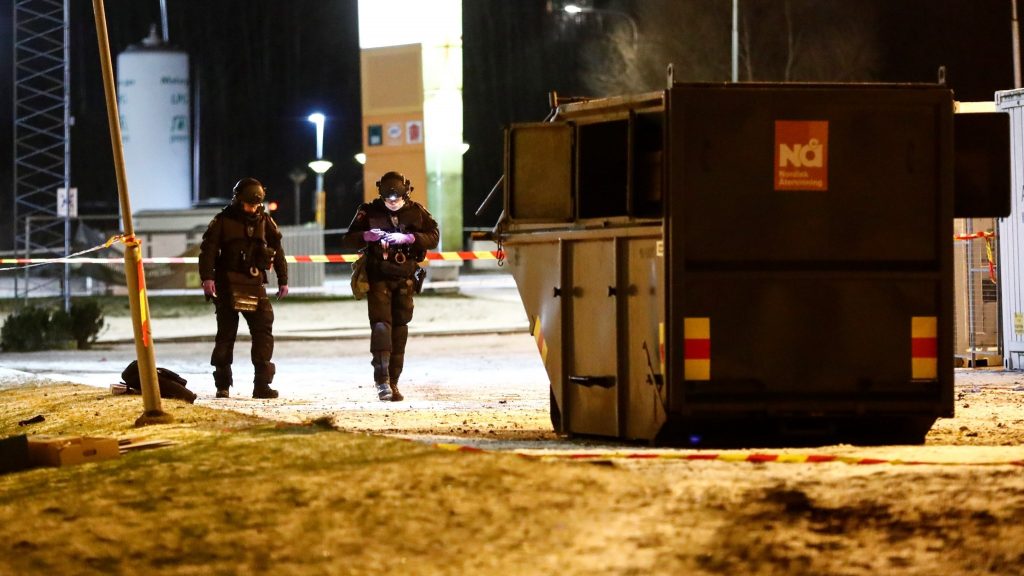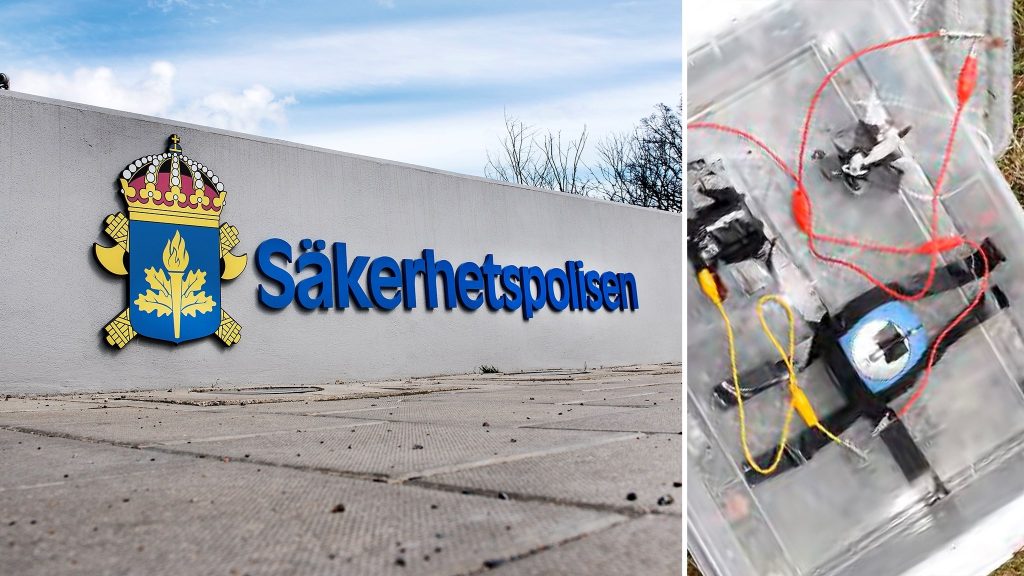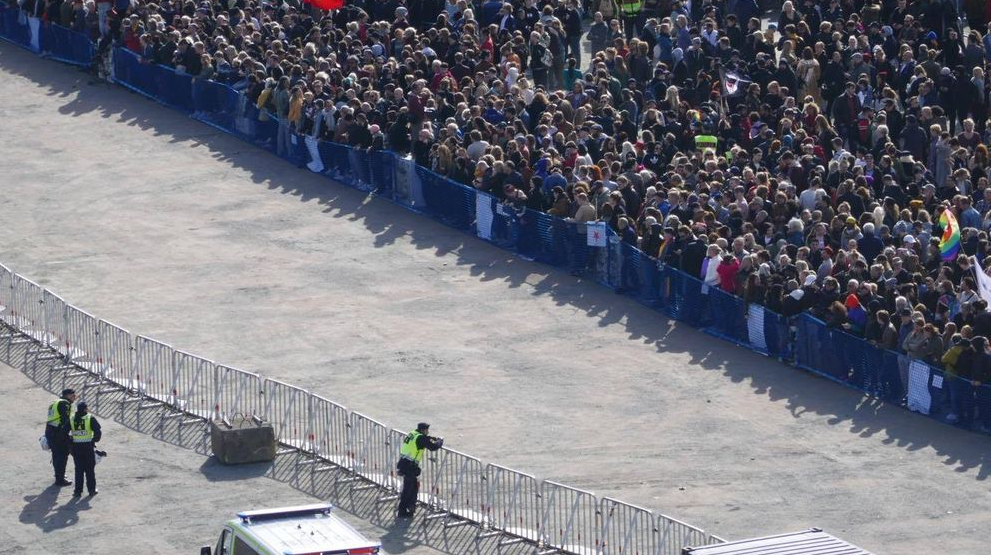Posts Tagged gothenburg
The court was not allowed to see important evidence at Nazi trial
Posted by b9AcE in Gothenburg, Refugees, Sweden, Translations on 2018-03-08

Nobody was convicted for the bombing at Axel Adler’s street. Photo: Thomas Johansson/TT
Relevant to this article is the article "Nazis placed bomb in spite of Swedish Security Service surveillance" from the previous day.
When two Nazis were prosecuted for a bombing against a refugee housing in Gothenburg, the court was not allowed to see important evidence. That is shown by [Swedish public service radio news] Ekot’s review. The Nazis were acquitted in the Court of Appeal.
The fifth of January 2017 a bomb explodes outside the refugee housing Formule 1 on Axel Adler’s street in Gothenburg. The cleaner Lamin Bojang is seriously injured.
– I heard a bang. I am flying and then people come and help me, says Lamin Bojang himself in the court.
A large part of his legs are blown off and he gets permanent injuries.
– I don’t feel well after the event. I think a lot about my future, says Lamin Bojang.
The SÄPO [Swedish Security Service] investigation quickly ties the bombing to two other deeds in the Gothenburg area, which are suspected to have been perpetrated by Nazis.
SÄPO has for some time had the local Nazi leader Viktor Melin under surveillance and when the investigation is finished the Security Service and the prosecutor claims that they by the aid of technical surveillance, GPS-positioning of Viktor Melin’s car, can tie him to the purchases of three egg timers which are identical to that which was used in the bomb.
This becomes an important evidence in the trial that follows.
– It was an important evidence, who purchases these egg timers, says Ralf G Larsson, who is President of the Court of Appeal for Western Sweden.
So if it is as the prosecutor claims, that there was technical evidence, that had been important?
– That had been important, says Ralf G Larsson.
But the court never gets to see any report from the technical surveillance.
– If we would closer, too detailed, describe the method the criminals and suspects would protect themselves against the method, says preliminary investigation leader, Public Prosecutor Mats Ljungqvist.
Instead a coordinator at SÄPO gives testimony, which hardly even seems to know how the surveillance works.
– Technical surveillance is a kind of positioning, where one can see positioning. Closer technical details I can unfortunately not detail, that is my ignorance, he says in court.
Court of Appeals President Ralf G Larsson:
– They claim they had some technical surveillance of him. (Viktor Melin editor’s note) They only tell about it. We never found out what kind of technical surveillance they had, which one usually gets in these kinds of cases.
The evidence is not sufficient and Viktor Melin is acquitted from the bombing. In the ruling the court demands the source material, the report from the technical surveillance.
That it would be sensitive to show such a report, the experts that Ekot has talked to do not understand. Magnus Ranstorp is a terror-researcher at the Swedish Defence University:
– It is not sensitive. I do not understand why they have not done it, he says.
– If one is to prove a crime it surely is good if one chucks forward as much evidence as possible. And that is surely the prosecutor’s task, says President of Court of Appeal Ralf G Larsson.
You can not say that this is a general problem which you have encountered many times, that one doesn’t present the entire evidence?
– No, I probably hardly ever have experienced that, if there are such evidence. I don’t know that of course.
– If the ruling is such that the judge in retrospect points out that proof of a certain kind could have changed the ruling, one can contemplate that, but I am not completely sure that we had been able to act differently, says Public Prosecutor Mats Ljungqvist.
To the cleaner Lamin Bojang, which was seriously injured by the bomb, the ruling means he does not get the right to compensation, being awarded damages.
The Nazi Viktor Melin is convicted for two other bombings, but gets a reduced sentencing.
We have sought the Security Service for an interview, but they have not wanted to participate.
This is a translation of the original public service radio article, as it was published on 2018-03-08, 04.00 local time.
The translation was done, due to global relevance and lack of official translation, by @b9AcE to the best of my ability
Nazis placed bomb in spite of Swedish Security Service surveillance
Posted by b9AcE in Gothenburg, Refugees, Translations on 2018-03-07

Three Nazis were later convicted for the bombing. Photo: Tomas Oneborg/TT as well as the Police.
Relevant to this article is the article "The court was not allowed to see important evidence at Nazi trial" from the next day.
[Public service radio news] Ekot can today reveal that Nazis in the beginning of 2017 were able to place a bomb at a refugee housing in Gothenburg in spite of [Swedish Security Service] SÄPO having them under surveillance. One of the Nazis was a suspect for a previous bombing.
– We saw electronics there, among other things a black tube that looked like a battery of some kind. It actually started ticking too, like an egg timer. Then it hit us that it could be a bomb, tells the location manager at Lilleby camping, Tommy Lassinati.
It is January 25, 2017 and he looks in a ICA [retail chain] bag that is standing behind one of the camper homes at the camping. The ICA bag contained a bomb on a timer.
– One of the cords had come loose from the egg timer.
So if it had not been disconnected when the egg timer finished ticking it had exploded?
– Yes absolutely, it would have.
Three Nazis were prosecuted and are later convicted for the bombing. But when we review the preliminary investigation protocols it becomes apparent that the Security Service had several opportunities to stop the bombing.
Already in the middle of December the Security Service got to know that the local Nazi leader Viktor Melin’s DNA was found on a bomb that had exploded outside premises in central Gothenburg, being used by leftist activists.
Public Prosecutor Mats Ljungqvist at the Public Prosecution Office for Security Cases becomes the preliminary investigation leader. In spite of the DNA hit he decides to not arrest Viktor Melin.
– Physical surveillance is placed on him to unravel how he moves, and who he contacts.
But the decision to not arrest Viktor Melin at once shows to have serious consequences. At the same time as he is under surveillance by SÄPO he and a buddy obtains materials that they use to build a new bomb. At one of the events SÄPO’s surveillance agents are even present too in the store. The surveillance agent tells it like this in the District Court
– When I enter, Melin is standing quite close to the right and looks at items that belong to housing or hobby. They talked very quietly with each other, as if because nobody else should hear. I walked around to hear what they said, and then they went quiet.
With SÄPO’s surveillance agent on his heels Viktor Melin buys plastic boxes, superglue, nails, and if one is to believe the preliminary investigation then travels to buy egg timers that may be used to make a bomb on timed delay.
Viktor Melin also obtains dynamite. Probably the delivery occurs on a parking where he meets another, explosives knowledgeable, Nazi, Jimmy Jonasson. SÄPO’s surveillance agent tells in the District Court:
– They have squeezed in with the rear end farthest in against the parking lot square, so it is impossible to see inside. I reacted against it being a cumbersome parking. We believe they did something, but we can not say what they did.
The man that they meet at the parking, Jimmy Jonasson, works as a construction diver, and it will turn out he has an entire container filled with dynamite on his yard a bit from Gothenburg. But that it would be dynamite that was handed over the Public Prosecutor Mats Ljungqvist only understands later.
– It is described as a conspiratorial meeting. I do not remember the wording, but I made the interpretation that something could have been handed over at this event.
At the evening of New Year’s Eve the surveillance agent of SÄPO follows Viktor Melin when he and another organized Nazi travels to Lilleby camping, which was used as a refugee housing.
– I sit in the car located closest to the vehicle in question. And when they go onto the deserted road which later leads to Lilleby camping I choose to turn off, the surveillance agent tells to the court.
The two Nazis park and sneak through the forest towards the camping. Preliminary investigation leader Public Prosecutor Mats Ljungqvist is off duty but gets a phone call from a colleague that is on call.
– SÄPO is nervous over that two persons with ties to the Nordic Resistance Movement [NMR] are located there, especially as there is information that NMR has had a special campaign aimed in particular against Lilleby camping. This altogether gives a rather worrisome picture.
But he does not see any cause to arrest the two Nazis or alert the refugee housing.
– At that time we do not primarily suspect that a bomb has been placed. Rather there are other hypotheses as to why he is moving in that area. And if we had seen any signs that it was a matter of a planned bombing spree we had naturally done something about it. I presume that, that we had ended it, says Public Prosecutor Mats Ljungqvist.
– I do not understand why this was not ended, says Magnus Ranstorp, one of Sweden’s premier terror-researchers.
– It is very remarkable. There are major reasons for them to know that it can develop to become dangerous.
It is New Year’s night, it is dark, they park right next to the forest, they have previously placed a bomb and they walk a sneak route up towards the camping. How would you interpret the situation?
– I would interpret it as something is about to happen, due to the locality, due to who was there. There is a history and there is no reason to take this any farther, and that it can come to endanger the life of another.
– I believe that every person that hears this would pose serious questions as to why this was not ended because it could have gotten really, really serious.
Neither is the camping searched for any bomb. Only over three weeks later the bomb is found by the location manager at the camping.
Why is the camping not searched?
– I can not answer that. The Security Service get to answer that. I have no reason to give their decision a review, says preliminary investigation leader Mats Ljungqvist.
– Should one have searched the camping? Yes with the results in hand one should have done that.
The three Nazis are convicted for the bombing at Lilleby camping. Viktor Melin is also convicted for the fist bomb, at the Syndicalists’ premises. Melin and Jonasson are later prosecuted also for a third bombing against a refugee housing, where a cleaner is seriously injured. This too is to have happened after SÄPO started surveillance on Melin. Viktor Melin can not be tied to the bombing location and both are acquitted by the Court of Appeals.
We have sought the Security Service but they have chosen not to participate. We have also sought Viktor Melin and Jimmy Jonasson, but without result.
This is a translation of the original public service radio article, as it was published on 2018-03-07, 04:00 local time.
The translation was done, due to global relevance and lack of official translation, by @b9AcE to the best of my ability.
Update.
A later article (as published 14:40 local time) also by public service radio contains the following audio segment, translated by me below, with the following title:
The sharp demand: Investigate [the Swedish Security Service]
The Parliamentary Ombudsmen [JO] must investigate if the prosecutor and SÄPO [Swedish Security Service] acted correctly when when they did not intervene in spite of seeing the suspected people they had under surveillance bought materials for a bomb,
That is the opinion of Sven-Erik Alhem, former Director of Public Prosecution Authority.
The suspected people also traveled to a refugee housing where SÄPO’s surveillance agent thought to see them make a weapon ready to fire, without them intervening.
Alhem: I would myself, if I myself was JO, I would definitely make a decision ex officio to begin an investigation regarding this.
Reporter: To get an answer to that question, if this was right or wrong.
Alhem: Yes, to get a complete investigation that can be the foundation for an assessment, simply. It is almost so that I have called on JO to make a decision.
Reporter: Yes, that is what you are doing now.
Alhem: Yes… but it is not certain that JO thinks the way I do.
Reporter: To not act against a person that is in the act of committing a crime, or is about to commit a crime, but instead defer and wait until one can prove even more serious criminality, that is called interimistic passivity.
That is a difficult judgement call according to Sven-Erik Alhem, to know when one should act and when one should not act and according to him there are no easy answers.
Alhem: It can be a difficult judgement call, to choose when one should act. If one acts too soon, then one risks to lose everything and forewarn those that one is performing survelliance against, that one is on their heels.
Reporter: Because in that which you have taken part of, can you see something right or wrong there?
Alhem: No that is, I don’t want to in a haphazard manner say anything, it would be wrong of me to make a call in the case, but… I reacted on what I heard being reported in the story and thought it was strange.
AFA [antifa] Gothenburg: Wide and popular anti-fascism stopped the Nazis
Posted by b9AcE in antifa, Gothenburg, Sweden, Translations on 2017-10-03
 The Nordic Resistance Movement (NMR) had mobilized vigorously for the demonstration in Gothenburg on their web page and on social media. The hope was that the demonstration would become the largest that NMR had organized, with a hope for over 1000 demonstration participants. In spite of heavy mobilization from the Nazis it became a failure with about 300-400 participants. The Nazis’ demonstration could be stopped thanks to a wide anti-fascism.
The Nordic Resistance Movement (NMR) had mobilized vigorously for the demonstration in Gothenburg on their web page and on social media. The hope was that the demonstration would become the largest that NMR had organized, with a hope for over 1000 demonstration participants. In spite of heavy mobilization from the Nazis it became a failure with about 300-400 participants. The Nazis’ demonstration could be stopped thanks to a wide anti-fascism.
Under the slogan “Stop the Nazis 30/9” the city’s anti-fascists have mobilized and distributed propaganda – a result that was seen Saturday, September 30.
Before noon 10000 people gathered at [the large public space] Heden to demonstrate against the Nazis in NMR. The counter-protesters at Heden were characterized by a wide anti-fascism and popular militancy. After the manifestation at Heden ended the police barriers were bypassed – not just by organized anti-fascists – but by a wide crowd of people that did not accept Nazis on the streets of Gothenburg.
NMR started their pre-gathering at [the supermarket] ICA Maxi, bordering to Mölndal locality. From there they took the back route to the Gårda district and at [the supermarket] ICA Focus NMR attempted to break out. The Nazis were kettled by the police, at the same time as thousands of counter-protesters arrived at the location. At the same time as thousands of people surrounded the Nazis at ICA Focus, anti-fascists enacted several successful blockades around Gårda. NMR were surrounded by thousands of people, and after several hours standing at the same spot they went back the same back route they arrived. During the day anti-fascists also performed several successful confrontations against Nazis that had chosen to demonstrate.
The demonstration never reached its planned start- or ending-point. Through a diversity of tactics, community and solidarity thousands of anti-fascists successfully stopped the Nazis from carrying out their demonstration – that is our victory!
We in AFA [antifa] Gothenburg also want to take this opportunity to send a greeting to all anti-fascists that tirelessly worked with the mobilization ahead of the demonstration as well as to all that chose to assemble against the Nazis.
Through community and solidarity we showed our strength.
/Anti-Fascist Action Gothenburg
Translated by b9AcE (https://soc.ialis.me/@b9AcE and https://twitter.com/b9AcE) to the best of my ability, from the original text in Swedish. Any errors are to be presumed mine, not antifa’s.